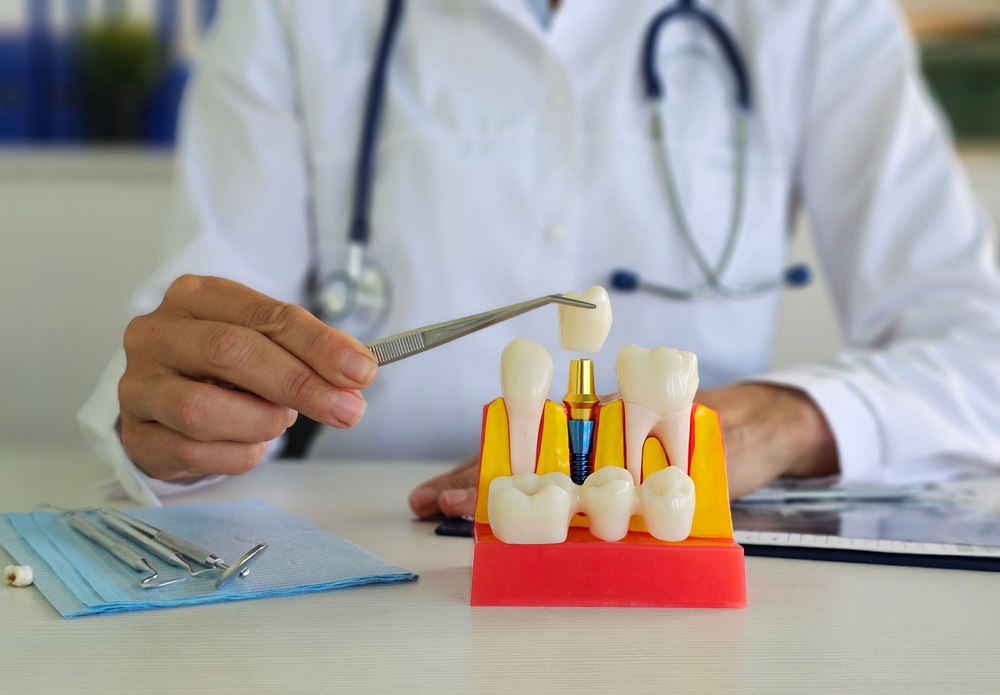Ensuring Dental Implant Success

Dental implants are a transformative solution. This treatment is for individuals seeking to restore functionality and aesthetics after tooth loss. Despite their high success rate, complications can arise if proper care and planning are not prioritized. “Dental implants are life-changing, but their success hinges on comprehensive planning and patient education,” comments Ashraf Dentistry. (Source: Healthline, Medically reviewed by Christine Frank, DDS, Written by Valencia Higuera, Updated on September 5, 2018, https://www.healthline.com/health/dental-implant-problems ).
Early and Late Dental Implant Failure
Complications with dental implants can occur early or develop over time. Early failures often stem from issues like improper healing or infection, while late failures may be linked to long-term habits or underlying conditions. “Recognizing the causes of implant failure early allows for timely interventions and ensures better outcomes,” states Ashraf Dentistry.
What Factors Impact Dental Implant Success?
Gum Disease
Gum disease can compromise the health of surrounding tissues, jeopardizing implant stability. “Healthy gums are the cornerstone of implant success. Addressing gum disease before implant placement is non-negotiable,” emphasizes Ashraf Dentistry.
Smoking
Cigarette or any kind of smoking has a detrimental impact on the body’s ability to recover after surgery. “Smoking reduces blood flow and impairs healing, making it a significant risk factor for implant complications,” notes Ashraf Dentistry.
Insufficient Jaw Bone
An adequate amount of healthy bone is crucial for implant support. “Bone quality and volume directly influence the stability of implants. Bone grafting techniques are excellent solutions for patients with deficiencies,” explains Ashraf Dentistry.
Medical Conditions
Medical circumstances like diabetes and autoimmune disorders can impede healing and elevate the likelihood of complications. “Understanding a patient’s medical history allows for tailored strategies that reduce risks and enhance success rates,” comments Ashraf Dentistry.
Poor Dental Maintenance
Neglecting oral hygiene can result in peri-implantitis, a condition like gum disease that affects dental implants. “Daily oral hygiene and routine dental visits or exams are essential to safeguard implants from infection,” says Ashraf Dentistry.
An Inexperienced Surgeon
The expertise of the dental professional or oral surgeon significantly impacts the success of dental implants. “Precision, experience, and the use of advanced techniques are pivotal to achieving optimal implant placement,” asserts Ashraf Dentistry.
Planning Before a Dental Implant Procedure
Careful planning is essential for a successful implant procedure. Diagnostic imaging, patient history, and treatment simulations are essential steps. “Every successful implant begins with meticulous planning that considers all aspects of the patient’s oral and overall health,” states Ashraf Dentistry.
Early Dental Implant Failure and Problems
- Infection at the Implant Site Infections can compromise the integration of the implant with the jawbone. “Preventing infections through sterile techniques and proper post-operative care is critical for implant success,” advises Ashraf Dentistry.
- Implant Micro-Movements Stability during the healing phase is crucial to success. “Even minor movements can disrupt the integration process, underscoring the need for careful post-surgical protocols,” comments Ashraf Dentistry.
- Insufficient Bone Support Without adequate support, the implant cannot integrate properly. “Bone deficiencies are a common challenge, but modern grafting techniques make implant placement possible for most patients,” explains Ashraf Dentistry.
- Allergic Reaction Although rare, allergic reactions to implant materials can occur. “Thorough assessments ensure the materials used are biocompatible and safe for each patient,” remarks Ashraf Dentistry.
- Failure to Follow Your Doctor’s Instructions Post-operative care is vital for healing. “Adhering to aftercare instructions is crucial to avoid complications and support successful recovery,” emphasizes Ashraf Dentistry.
Late Dental Implant Failure and Problems
Over time, implants can fail due to wear, peri-implantitis, or changes in overall health. “Routine maintenance and addressing any issues early are vital to preserving the function and aesthetics of implants,” says Ashraf Dentistry.
What Are Signs of Dental Implant Failure?
Symptoms like persistent pain, swelling, or implant mobility may indicate failure. “Prompt evaluation of warning signs can prevent further complications and safeguard the implant,” advises Ashraf Dentistry.
Preventative Care
Maintaining excellent oral hygiene and attending regular dental appointments are crucial for long-term implant success. “Preventative care, including professional cleanings and monitoring, is essential to the longevity of dental implants,” comments Ashraf Dentistry.
Dental Implant Alternatives
Dental Bridge
This restorative treatment can replace one or more missing teeth. Options such as traditional bridges, resin-bonded bridges, and cantilever bridges provide solutions tailored to different needs. “Bridges offer reliable solutions for patients who may not opt for implants due to medical or financial reasons,” states Ashraf Dentistry.
Removable Partial Dentures
These are cost-effective and suitable for some patients. “Partial dentures provide flexibility and affordability while restoring essential functions like chewing and speaking,” remarks Ashraf Dentistry.
Dental implants offer a remarkable solution for replacing teeth but require careful planning, skilled execution, and diligent aftercare. “The journey to a successful dental implant procedure begins with informed decisions and ongoing commitment to oral health,” concludes Ashraf Dentistry.
